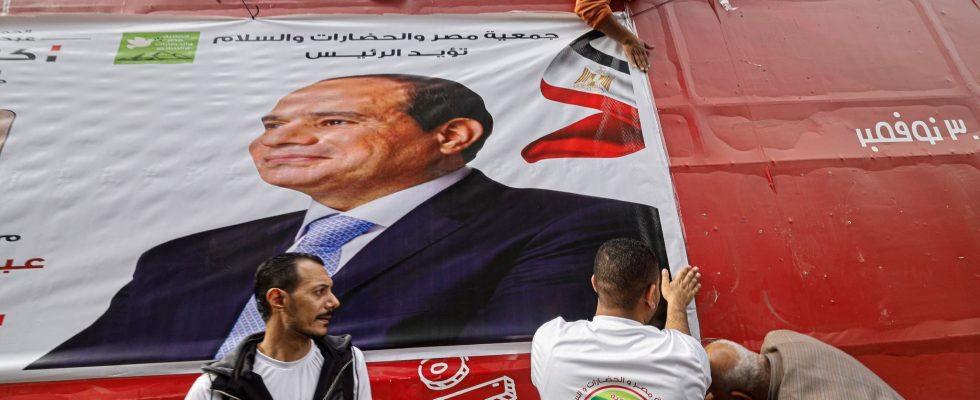In Cairo, the suspense is not really in the ballot boxes, after three days of voting from December 11 to 13. Only one question: can Abdel Fattah al-Sissi still improve his score in the presidential election? The marshal had reached 96% in 2014, 97% in 2018. If his re-election is in no doubt, the results should not be known until Monday, December 18, time to go through all the ballots in favor of the all-powerful president .
However, al-Sissi is not exactly calm. Since October 7 and the start of the war in the Gaza Strip, the Egyptian president has feared the consequences of the conflict on his country, weakened by an out-of-control debt, inflation at 40% and more than half of its population under the threshold of poverty. “Since the start of the conflict, the entire region has feared that the war in Gaza would destabilize Egypt and Jordan,” explains Camille Lons, Persian Gulf specialist at the European Council on International Relations. The risk of a massive influx of population from Gaza to Egypt, in particular, was identified very early on.”
Egypt categorically refuses to welcome Palestinians
Faced with incessant Israeli strikes, nearly two million Palestinians have fled to the south of the Gaza Strip, crowded into an area near the border with Egypt. Subjected to deplorable living conditions, these displaced people find themselves blocked by a separation barrier, walled in steel and concrete, along the twelve kilometers of the separation line with the Sinai desert. They also come up against the intransigence of Egyptian officials, who refuse to welcome any Palestinian refugees. “They cannot be complicit, even indirectly, in current events,” maintains Camille Lons. Behind the scenes, Egyptian diplomats warned their European counterparts that, in the event of a massive arrival of Palestinian refugees on their soil, they would let as many migrants pass to Europe.
Officially, al-Sissi’s Egypt excludes welcoming Palestinians for fear that they will never be able to return to the Gaza Strip, as during the Nakba, the exodus of hundreds of thousands of Palestinians at the creation of Israel, in 1948. But this categorical refusal is also linked to the economic crisis experienced by Egypt and to security questions: Sinai has been, for around twenty years, a headache for the Egyptian army, which is fighting dozens of terrorist groups in the region. Cairo has also regularly accused Hamas of supporting these groups in its fight against the Egyptian state.
The border wall can be destroyed
But will al-Sissi have a choice? “This population movement, extremely dangerous for the stability of Egypt, will not take place with the consent of Cairo or the international community, but that does not mean that it will not take place,” said Hugh Lovatt, Middle East specialist at ECFR. During a conference in Qatar on December 10, UN Secretary General Antonio Guterres warned of the terrible conditions in which Palestinian refugees near the border find themselves, leaving him to fear “a massive displacement towards the Sinai.” “I expect that law and order will soon completely collapse, causing a much worse situation,” Guterres said.
A question, therefore, haunts the nights of Marshal al-Sissi: what will the Egyptian barriers do in the face of the despair of two million Gazans? “If the Israeli army continues to advance towards the South, with this disproportionate violence and this growing humanitarian crisis, it is entirely possible that the Palestinians will destroy the separation wall with Egypt in Rafah,” warns Hugh Lovatt. Already in 2008, Hamas demolished part of the barriers on the Egyptian border, allowing tens of thousands of Palestinians to break the blockade imposed on the Gaza Strip by Egypt and Israel.
These last weeks, according to the New York Times, the Egyptian army erected sand barriers and transferred tanks near the border with the Gaza Strip. With the intention of using it against civilians?
.
